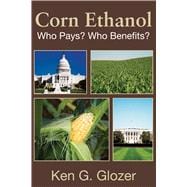
Note: Supplemental materials are not guaranteed with Rental or Used book purchases.
Purchase Benefits
What is included with this book?
| List of Figures | p. ix |
| Preface | p. xi |
| Acknowledgments | p. xiii |
| Political History | p. 1 |
| Introduction | p. 3 |
| Ethanol as a Transportation Fuel: How Federal Corn-Ethanol Policy Evolved | p. 5 |
| Carter Administration, 1977 to 1981 | |
| Reagan Administration, 1981 to 1989 | |
| Bush I Administration, 1989 to 1993 | |
| Clinton Administration, 1993 to 2001 | |
| Bush II Administration, 2001 to 2009 | |
| Evaluating Advocates' Policy Claims | p. 71 |
| Is U.S. Energy Security Strengthened? | p. 73 |
| Does the Environment Benefit? | p. 89 |
| Other Claims: Are Budget Costs Reduced? Is the Trade Balance Improved? Is Rural Employment Increased? | p. 125 |
| Who Pays for the Policy, and Who Benefits from It? | p. 131 |
| Conclusions | p. 157 |
| Supporting Documents | p. 161 |
| International Energy Agency, IEA Response System for Oil Supply Emergencies | p. 163 |
| History of World Oil Market Petroleum-supply Interruptions | p. 165 |
| State-by-State Ethanol Subsidies | p. 171 |
| Endnotes | p. 197 |
| About the Author | p. 209 |
| About the Hoover Institution's Shultz-Stephenson Task Force on Energy Policy | p. 211 |
| Index | p. 213 |
| Table of Contents provided by Ingram. All Rights Reserved. |
The New copy of this book will include any supplemental materials advertised. Please check the title of the book to determine if it should include any access cards, study guides, lab manuals, CDs, etc.
The Used, Rental and eBook copies of this book are not guaranteed to include any supplemental materials. Typically, only the book itself is included. This is true even if the title states it includes any access cards, study guides, lab manuals, CDs, etc.